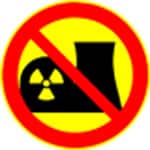Nuclear Failure on Environmental Justice
Take Action
Join With Us
Resources
Subscribe
Nuclear Environmental Injustice
One aspect of nuclear power reactors we rarely hear about is the is environmental injustice associated with them. Beyond the nuclear waste created, safety issues, health effects from radiation, and the high cost of construction, environmental injustice is the skeleton in the nuclear industry’s closet. The industry may claim that abuse of indigenous peoples and marginalized communities was a only problem in the past, but it continues to this day.
A History of Nuclear Environmental Injustice
Because nuclear power developed along with nuclear weapons, the injustices to people, communities, and their lands that happened to be in the way are similar for both. The same uranium mines that were – and still are – supplying the material for bombs also provide it for nuclear power plants. As a result of increasing demand, more uranium mines have opened, especially in Africa. And whether in Africa, Canada, or the United States the local populations have never been told of the health risks of working in the mines, or the threats to the health, environment, and well-being of the nearby communities. It is only years later, when the effects of exposure to radiation appear, that questions are raised. But by then the water, land, and food have been contaminated, and cultural resources destroyed.
Today, nuclear power advocates are pushing to site hundreds of nuclear power plants of all sizes spread across the United States, and for that matter, the world, with little concern or transparency about the risks to health or security. The risk of nuclear weapons proliferation is not even considered.
What can we expect from an industry that is unwilling to recognize the damage it has done and will do? For example, an industry organization that promotes nuclear power has an Environmental Justice statement on its website, but makes no mention of the harm already inflicted on indigenous peoples and local communities.
Following are links to articles that highlight the history of the effects of the nuclear age on indigenous peoples.
Canada
United States
Natives of the Columbia Basin (Washington State)
Navajo Nation: Cleaning Up Abandoned Uranium Mines | US EPA
Church Rock, America’s Forgotten Nuclear Disaster, is still Poisoning Navajo Lands 40 Years Later
Africa
The forgotten mine that built the atomic bomb
Desert residents pay high price for lucrative uranium mining
Australia
Uranium mines harm Indigenous people – so why have we approved a new one?
Utilities in the Pacific Northwest are in the process of planning for reducing their carbon footprint and while some are looking at energy efficiency and conservation along with renewablea, others are unfortunately looking to nuclear power. It's important we encourage those utilities seeking nuclear free options to continue down that path. At the same time, we need to let those utilities planning on nuclear power know they need to follow a nuclear free path and focus on local energy projects. Nuclear power costs will only add significant costs to electric bills in addition to the increased costs for fixing the electric grid for reliability.
Action Needed Now!
Tell Your Electric Utility
Now is not the time to solve one problem with another, one that will increase electric rates and impact future generations with radioactive waste. Let your utility know you want your ratepayer dollars to be used for energy efficiency, community renewables, and rooftop solar. Here are the utilities that we know are considering new nuclear reactors:
Clark Public Utility District - Grant County Public Utility District - Pacific Power
Resources
Note: To expand the table go the bottom of the table and on the righthand corner click on "View larger version." For more help view the Document Library Guide.
